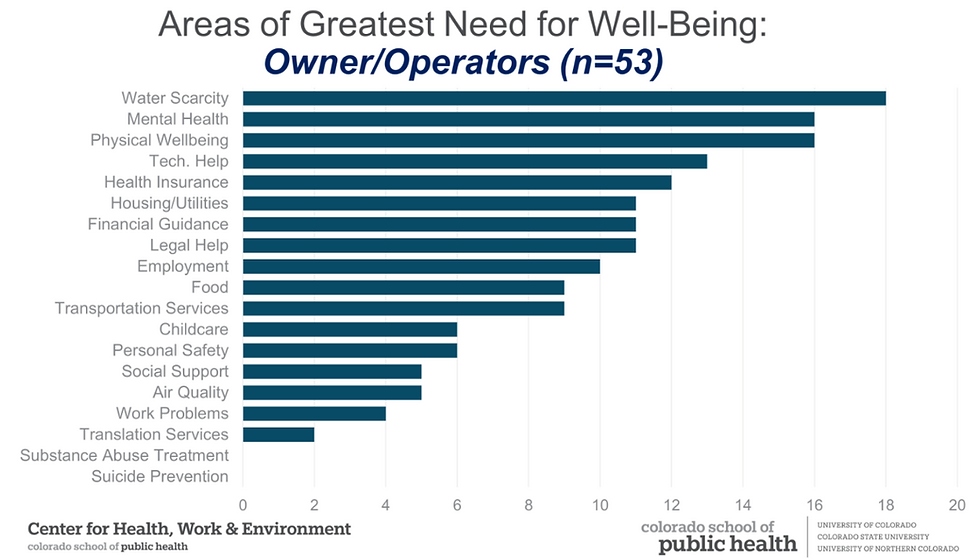The Agricultural Workers Summary
- Christine Canaly
- Feb 29, 2024
- 3 min read
Updated: Dec 13, 2024
by Anna Lee Vargas, Projects Manager
A recently compiled report has been completed by the Colorado School of Public Health, under the direction of Dr. Kathy James and Nick Stoll (MPH), based on a survey, to gather a better understanding of the stressors that Agricultural Operators/owners and Field Workers face within the San Luis Valley. Local community members Shirley Romero Otero and Augusto Basterrechea, along with SLV Ecosystem Council, provided event opportunities for participants to engage.
This came about because local leaders raised concern about a behavioral health crisis within the San Luis Valley (SLV), and faculty members within the Center for Health, Work & Environment engaged consulting support with residents, to identify ways researchers could support the community.
As climate change stressors continue to impact the environment and human health, residents cited concern for friends and family who rely on the agriculture industry for their livelihood. With local leaders and industry experts providing guidance, the Public Health team used a “Total Worker Health” approach to survey local Ag workers and organizations.
The goal is to assess the state of behavioral health and provide additional support and intervention for the community. According to the National Institute for Occupational Safety and Health (NIOSH), “Total Worker Health” includes policies, programs, and practices that integrate protection from work-related safety and health hazards with the promotion of injury and illness prevention efforts to advance worker well-being.
Over the course of a 9-month period, 221 agriculture workers were encouraged to take part in the survey. Of these participants, 53 identified as owners/operators and 168 identified as field workers. Overall, there was a mean completion rate of 81%.
Please Note: Participants were not required to answer every question on the survey. The participant demographics are as follows: 58% were female, 40% were male, 79% Hispanic/Latino, 4% Indigenous, 27% White, 23% were between the ages of 18-29, 27% were between the ages of 30-44, 24% were between the ages of 45-64, 13% were 65+.
The Needs Assessment showed that owners/operators identified drought, physical health, and mental health as primary sources of stressors. Field workers identified the lack of nutritious food, transportation, and financial stability as primary sources of stressors. As analysis continues, the Public Health team hopes to compare the behavioral health of SLV Ag workers to the behavioral health of other Colorado workers in different occupations.


Self-Reported Mental Health Conditions

During the past 30 days, how many days was your mental health not good?

Additional Needs to Serve Agriculture Workers
1. Have support available to farmers/farmworkers any time (evenings and weekends)
2. An increased presence of behavioral health providers in settings frequented by farmworkers (community events, community gathering places, etc).
3. Spanish-speaking therapists with flexible hours and availability for workers
4. Transportation and financial resources
5. More resources to help farmworkers who are undocumented.
6. Collaboration, referral system/screening form in place with agencies or programs that have outreach teams that are in the homes of workers.
7. Have a provider that can do home visits (year-round workers) or migrant camps.
8. Most resources we work with do not require the collection of information to show if someone is a farmer or farmworker. This data should become part of the data collection
9. Continued specialized training in cultural competency of unique stressors and other cultural factors to farmers/farmworkers.
As a pilot project, the scope of this funding was limited to assessing the wellbeing of SLV Ag workers. This information is currently being used to initiate conversations with other researchers and community organizations, and identify ways to expand upon this building of outreach work.




Comentários